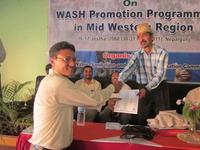Report from second review meeting on sustainable WASH.
Published on: 20/06/2011
Objective
In 2010, there were two important regional meetings held resulting in consensus from stakeholders and two joint commitments; the Nepalgunj Commitment and the Surkhet Declaration. The meetings tried to address improved coordination, harmonisation and local resource mobilisation (allocation of 10% to 15% of total Village Development Committee/District Development Committee budget for Sanitation and Hygiene). The main objective of the second meeting was to assess the effectiveness in implementation and to develop more clarity and a higher level of commitment. The meetings were also used to share good practices from different sectors and districts.
Outcomes
It was a good achievement in terms of bringing almost all key stakeholders together for discussion and sharing their experiences. There was recognition at regional level (e.g reward to best performer Village District Committee/District Development Committee, Government Staff, NGOs, Development Agencies, Journalists, community members, women etc.).

The meetings helped to develop a common understanding between the stakeholders and discussed areas of improvement. For instance the District WASH Coordination Committee needed help in dealing with issues related to urban and emerging towns, water functionality etc. There is poor co-operation between municipalities and the District WASH Coordination Committee in the implementation. In this regard, the Secretary and Joint Secretary from the Ministry of Local Development promised that the Ministry will ask all municipalities concerned to co-operate and to put sanitation high on their agenda. The participants agreed to allocate or increase resources for sanitation and hygiene promotion. Most of the agencies realised that the sanitation programme is more focused on achieving Open Defecation Free (ODF) areas, but less on sustainability of ODF. Also more emphasis should be placed on post-ODF activities such as hygiene behaviour change, effective monitoring mechanisms and minimum criteria for declaring areas ODF etc.
Collaboration with other stakeholders
Various members of the Regional WASH Coordination Committee contributed to the meeting. UNICEF gave financial support for the organisation of the event. SNV provided technical support for preparation, facilitation and documentation of the event. The whole organisation of the event was led by the Government (Regional Monitoring and Supervision Office/Department of Water Supply and Sewerage/Ministry of Physical Planning and Works with the support from Regional WASH Coordination Committee).
Building blocks
The success stories from Kalikot (one of the Sustainable Sanitation and Hygiene for All programme districts) were presented as one of the four best cases. We could also share the outcome of the district Behaviour Change Communication strategy workshop. The declaration and other outcomes of the discussion will be the basis for a sanitation and hygiene programme in days to come. The meeting was also a good opportunity to influence ideas at the regional and national level and refine policies for effective implementation. The activities are not just limited to the district level, but also provide opportunities to scale up good practices at the regional and national level.
Contact: Bimal Tandukar, SNV